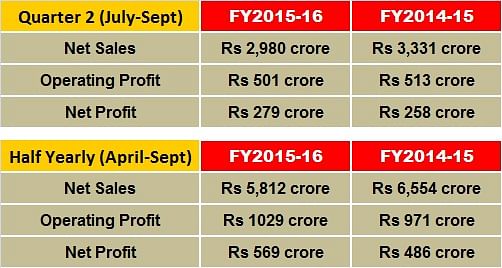Apollo Tyres reports 8% jump in net profit in Q2 on lower input costs
While Indian operations reported flat revenues, delayed onset of winters in Europe, resulted in lesser than expected sales and pre-orders for winter tyres, adversely impacting the company’s European operations.
Apollo Tyres reported an 8% increase in its net profit for the July-September quarter, as lower input costs aided the company’s bottomline despite lower net sales.
In the quarter ended September, the company reported a net profit of Rs 279 crore, with net sales of Rs 2,980 crore against net sales of 3,331 crore a year ago. Input costs declined to Rs 1,351.76 crore from Rs 1,756.30 crore a year ago. Lower finance costs and an exceptional gain of Rs 47.77 crore on sale of property by the company’s wholly owned subsidiary Apollo Tyres Africa, resulted in better profits during the quarter.
For the first half of the year (April-September 2015), the company posted a profit of Rs 569 crore, on net sales of Rs 5,812 crore. While Indian operations reported flat revenues, delayed onset of winters in Europe, resulted in lesser than expected sales and pre-orders for winter tyres, adversely impacting the company’s European operations, the company said.

Commenting on the results, Onkar S Kanwar, chairman, Apollo Tyres, said: “Despite the increasing import of truck-bus radials (TBR), which continues unabated into India, we have been able to hold on to our revenues. In the July-September quarter, the TBR imports increased almost 100%, as compared to the same period last year, of which, the economy/Chinese brands contributed nearly 90%. The problem of low cost imports is putting at risk the entire ‘Make in India’ clarion call by the Indian government.”
RELATED ARTICLES
Rajiv Bajaj reappointed MD and CEO of Bajaj Auto for five-year term
Bajaj Auto’s Board of Directors has approved the re-appointment of Rajiv Bajaj as the company’s MD and CEO for another f...
JSW MG Motor launches Comet EV Blackstorm edition
The key highlights of the Comet EV Blackstorm, which is now the top-end variant, are its ‘Starry Black’ exterior along w...
Maruti Suzuki begins production at new Kharkhoda plant
Phase 1 of the Kharkhoda plant will have an annual production capacity of 250,000 units and produce the Brezza compact S...






 By Shourya Harwani
By Shourya Harwani
 30 Oct 2015
30 Oct 2015
 3429 Views
3429 Views








 Ajit Dalvi
Ajit Dalvi

